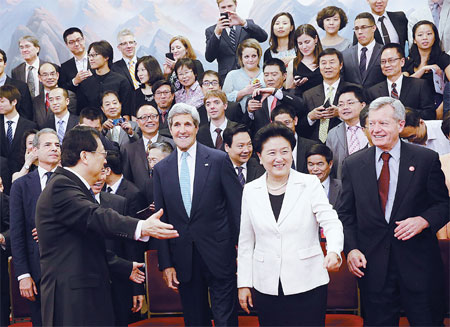China, US pledge partnership




Despite tension on sensitive issues, nations' leaders vow to stay course
China and the United States highlighted their resolve on Thursday to forge a stronger cooperative partnership.
But while increasing exchanges in various fields, including the military, would boost mutual trust, more effort is needed in sensitive areas such as territorial issues in the East and South China seas if Sino-US ties are to reach their full potential and avoid strategic rivalry, observers said.
The outcome document from the sixth China-US Strategic and Economic Dialogue (S&ED) held in Beijing on July 9-10 reaffirmed both sides' joint efforts in tackling bilateral, regional and global issues, such as climate change, non-proliferation, military-to-military exchanges, wildlife trafficking, denuclearization of the Korean Peninsula, reconciliation in Afghanistan and global health, issues many believe stand no chance of succeeding without close cooperation between the two nations.
President Xi Jinping said he and President Barack Obama are determined to ensure the healthy and stable growth of China-US ties and ensure that they stay "on a correct track".
"China is willing to make concerted efforts to this end," he told the two delegations at the S&ED and the China-US High-Level Consultation on People-to-People Exchange.
US Secretary of State John Kerry, as Obama's representative, told Xi that Washington welcomes and wants a strong, prosperous and stable China.
"And we mean what we say when we emphasize that there's no US strategy to try to push back against or be in conflict with China," he said.
After discussions on topics ranging from military relations to climate change and cybersecurity, State Councilor Yang Jiechi restated China's stance on territorial issues to a roomful of reporters on Thursday.
"China will continue to steadfastly protect its territorial and maritime rights" in the South and East China seas, Yang said at a news conference as the talks wrapped up.
Yang urged the US to adopt an objective and impartial stance and abide by its promise not to take sides but rather to play a constructive role in safeguarding regional peace and stability.
Zha Peixin, from the foreign policy advisor committee of China's Ministry of Foreign Affairs and former Chinese ambassador to Britain, told a seminar at the Center for Strategic and International Studies in Washington on Thursday that building a new type of major country relationship, a concept agreed upon by Xi and Obama during their summit in Sunnylands, California last year is an unprecedented endeavor, a long-term and arduous mission.
"It needs the concerted involvement and tireless efforts from both sides. But as long as we are firm in our determination, and work in coordination, US-China relationship will have a bright future," Zha said.
Zhu Yinghuang, editor-in-chief emeritus of China Daily Newspaper Group, expressed concern over the US pivot to Asia policy, which many Chinese believe has made the region less peaceful since its launch. "Before that, for so many years, it was a peaceful region," Zhu said at the CSIS talk on Thursday.
But he said the good news is that all the key issues have been discussed at the just concluded S&ED and President Obama is going to China in November to meet President Xi.
"Hopefully more than one year after the Sunnylands summit, they will come up with more substantial progress and more creative measures in improving US-China relations," Zhu said.
Sarah Forbes, a senior associate with the World Resources Institute, applauded China and the US for establishing eight new pacts this week to reduce their greenhouse gas emissions.
"China and the United States are world's leaders when it comes to CCUS (carbon dioxide capture, utilization and storage) research and development, and this week's agreements build on a long history of CCUS collaboration between the two nations," she said.
John Frisbie, president of the US-China Business Council, said in a statement on Thursday that the S&ED continues to provide a valuable platform for comprehensive, high-level talks between senior government officials from the US and China.
"These annual gatherings provide an opportunity to cover the range of issues and interests in the relationship, rather than do so piecemeal," he said.
Frisbie said he was pleased to hear of President Xi's strong support for concluding the Bilateral Investment Treaty (BIT) as soon as possible.
Shi Yinhong, an expert on Sino-US relations at Renmin University of China, said the world's No 1 and No 2 economies have made great progress and enjoy huge potential in economic, educational and cultural cooperation, but their strategic friction remains a bottleneck.
Sino-US ties were strained recently over the territorial issues between China and US allies Japan and the Philippines, and by US allegations of Chinese cyberspying. These thorny issues call for proper management for the sake of Asia-Pacific stability, even though it may be a long-term task, Shi said.
Contact the writers at zhaoshengnan@chinadaily.com.cn and chenweihua@chinadailyusa.com.
|
Vice-Premier Liu Yandong (center right), United States Secretary of State John Kerry (center left) and students and entrepreneurs from both countries pose for photos before the fifth annual US-China High-Level Consultation on People-to-People Exchange in Beijing on Thursday. Xu Jingxing / China Daily |















